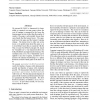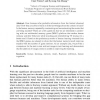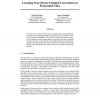64 search results - page 4 / 13 » Learning to commit in repeated games |
104
click to vote
ICML
2003
IEEE
16 years 3 months ago
2003
IEEE
We present BL-WoLF, a framework for learnability in repeated zero-sum games where the cost of learning is measured by the losses the learning agent accrues (rather than the number...
113
click to vote
ICML
2008
IEEE
16 years 3 months ago
2008
IEEE
Quite a bit is known about minimizing different kinds of regret in experts problems, and how these regret types relate to types of equilibria in the multiagent setting of repeated...
167
Voted
PKAW
2010
15 years 1 months ago
2010
How humans infer probable information from the limited observed data? How they are able to build on little knowledge about the context in hand? Is the human memory repeatedly const...
143
click to vote
IJCAI
2001
15 years 4 months ago
2001
R-max is a very simple model-based reinforcement learning algorithm which can attain near-optimal average reward in polynomial time. In R-max, the agent always maintains a complet...
119
Voted
NIPS
2003
15 years 4 months ago
2003
We study how to learn to play a Pareto-optimal strict Nash equilibrium when there exist multiple equilibria and agents may have different preferences among the equilibria. We focu...



